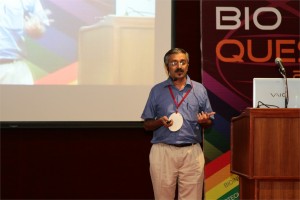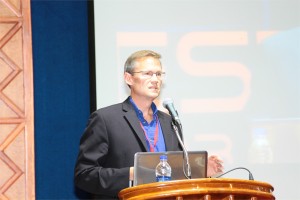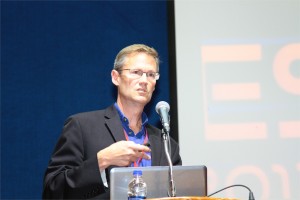 Krishnakumar Menon, Ph.D.
Krishnakumar Menon, Ph.D.
Associate Professor, Centre for Nanosciences & Molecular Medicine, Amrita University, Kochi, India
A Far-Western Clinical Proteomics Approach to Detect Molecules of Clinical and Pathological Significance in the Neurodegenerative Disease Multiple Sclerosis.
Multiple Sclerosis (MS), an autoimmune neurodegenerative disorder of the central nervous system. The disease affects young adults at their prime age leading to severe debilitation over several years. Despite advances in MS research, the cause of the disease remains elusive. Thus, our objective is to identify novel molecules of pathological and diagnostic significance important in the understanding, early diagnosis and treatment of MS. Biological fluids such as cerebrospinal fluid (CSF), that bathe the brain serve as a potential source for the identification of pathologically significant autoantibody reactivity in MS. In this regard, we report the development of an unbiased clinical proteomics approach for the detection of reactive CSF molecules that target brain proteins from patients with MS. Proteins of myelin and myelin-axolemmal complexes were separated by two-dimensional gel electrophoresis, blotted onto membranes and probed separately with biotinylated unprocessed CSF samples. Protein spots that reacted specifically to MS-CSF’s were further analyzed by matrix assisted laser desorption ionization-time-of-flight time-of-flight mass spectrometry. In addition to previously reported proteins found in MS, we have identified several additional molecules involved in mitochondrial and energy metabolism, myelin gene expression and/or cytoskeletal organization. Among these identified molecules, the cellular expression pattern of collapsin response mediator protein-2 and ubiquitin carboxy-terminal hydrolase L1 were investigated in human chronic-active MS lesions by immunohistochemistry. The observation that in multiple sclerosis lesions phosphorylated collapsin response mediator protein-2 was increased, whereas Ubiquitin carboxy-terminal hydrolase L1 was down-regulated, not only highlights the importance of these molecules in the pathology of this disease, but also illustrates the use of our approach in attempting to decipher the complex pathological processes leading to multiple sclerosis and other neurodegenerative diseases. Further, we show that in clinicaly isolated syndrome (CIS), we could identify important molecules that could serve as an early diagnostic biomarker in MS.
 Terry Hermiston, Ph.D.
Terry Hermiston, Ph.D.
Vice President, US Biologics Research Site Head, US Innovation Center Bayer Healthcare, USA
ColoAd1 – An oncolytic adenovirus derived by directed evolution
Attempts at developing oncolytic viruses have been primarily based on rational design. However, this approach has been met with limited success. An alternative approach employs directed evolution as a means of producing highly selective and potent anticancer viruses. In this method, viruses are grown under conditions that enrich and maximize viral diversity and then passaged under conditions meant to mimic those encountered in the human cancer microenvironment. Using the “Directed Evolution” methodology, we have generated ColoAd1, a novel chimeric oncolytic adenovirus. In vitro, this virus demonstrated a >2 log increase in both potency and selectivity when compared to ONYX-015 on colon cancer cells. These results were further supported by in vivo and ex vivo studies. Importantly, these results have validated this methodology as a new general approach for deriving clinically-relevant, highly potent anti-cancer virotherapies. This virus is currently in clinical trials as a novel treatment for cancer.
 Bodo Eickhoff, Ph.D.
Bodo Eickhoff, Ph.D.
Senior Vice-President, Head of Sales and Marketing for Roche Applied Science, Germany
New paths for treatment of complex diseases: target combinatorial drug therapy
Several types of diseases show a complex pathogenesis and require targeted as well as combinatorial drug treatment. A classical example, Tuberculosis, was thought for decades to be managable by triple therapy, however now requiring new therapeutic approaches due to multi drug resistant strains. HIV and AIDS can only be kept under control by combinations of specific, virus-protein targeted drugs, requiring constant monitoring of resistance patterns and modulation of drug combinations during life-long therapy. As a third example, Cancer in all its different variations, requires detailled molecular understanding to enable targeted therapy. New technologies provide more and in depths molecular insights into pathomechanisms and resulting treatment options. However, is there an alternative way to approach complex diseases by holistic models? Can restoring of apoptosis-capabilities of transformed cells be an example of such an alternative path? How do we in future adress major unresolved topics like increasing drug resistance in bacterial infections, lack of anti-viral drugs, treatment of parasite diseases like Malaria, and newly emerging infectious diseases in research and fast translation of these results into diagnosis and treatment?



